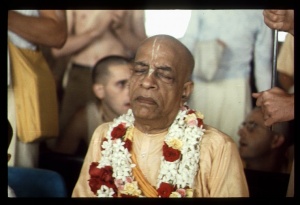SB 5.7.4: Difference between revisions
m (1 revision(s)) |
No edit summary |
||
| Line 1: | Line 1: | ||
{{info | {{info | ||
|speaker= | |speaker=Śukadeva Gosvāmī | ||
|listener=King | |listener=King Parīkṣit | ||
}} | }} | ||
[[Category:Srimad-Bhagavatam - Canto 05 Chapter 07|S04]] | |||
[[Category:Bhagavatam Verses Spoken by Sukadeva Gosvami - Vanisource|050704]] | |||
<div style="float:left">'''[[Srimad-Bhagavatam]] - [[SB 5|Fifth Canto]] - [[SB 5.7: The Activities of King Bharata|Chapter 7: The Activities of King Bharata]]'''</div> | |||
<div style="float:right">[[File:Go-previous.png|link=SB 5.7.3]] '''[[SB 5.7.3]] - [[SB 5.7.5]]''' [[File:Go-next.png|link=SB 5.7.5]]</div> | |||
{{RandomImage}} | |||
==== TEXT 4 ==== | ==== TEXT 4 ==== | ||
<div class="verse"> | |||
<div | :sa bahuvin mahī-patiḥ pitṛ-pitāmahavad | ||
sa bahuvin mahī-patiḥ pitṛ-pitāmahavad uru-vatsalatayā sve sve karmaṇi vartamānāḥ prajāḥ sva-dharmam anuvartamānaḥ paryapālayat | :uru-vatsalatayā sve sve karmaṇi | ||
:vartamānāḥ prajāḥ sva-dharmam | |||
:anuvartamānaḥ paryapālayat | |||
</div> | </div> | ||
| Line 14: | Line 22: | ||
==== SYNONYMS ==== | ==== SYNONYMS ==== | ||
<div class="synonyms"> | |||
<div | ''saḥ''—that King (Mahārāja Bharata); ''bahu-vit''—being very advanced in knowledge; ''mahī-patiḥ''—the ruler of the earth; ''pitṛ''—father; ''pitāmaha''—grandfather; ''vat''—exactly like; ''uru-vatsalatayā''—with the quality of being very affectionate to the citizens; ''sve sve''—in their own respective; ''karmaṇi''—duties; ''vartamānāḥ''—remaining; ''prajāḥ''—the citizens; ''sva-dharmam anuvartamānaḥ''—being perfectly situated in his own occupational duty; ''paryapālayat''—ruled. | ||
</div> | </div> | ||
| Line 22: | Line 29: | ||
==== TRANSLATION ==== | ==== TRANSLATION ==== | ||
<div class="translation"> | |||
<div | |||
Mahārāja Bharata was a very learned and experienced king on this earth. He perfectly ruled the citizens, being himself engaged in his own respective duties. Mahārāja Bharata was as affectionate to the citizens as his father and grandfather had been. Keeping them engaged in their occupational duties, he ruled the earth. | Mahārāja Bharata was a very learned and experienced king on this earth. He perfectly ruled the citizens, being himself engaged in his own respective duties. Mahārāja Bharata was as affectionate to the citizens as his father and grandfather had been. Keeping them engaged in their occupational duties, he ruled the earth. | ||
</div> | </div> | ||
| Line 29: | Line 35: | ||
==== PURPORT ==== | ==== PURPORT ==== | ||
<div class="purport"> | |||
It is most important that the chief executive rule the citizens by keeping them fully engaged in their respective occupational duties. Some of the citizens were ''brāhmaṇas'', some were ''kṣatriyas'', and some were ''vaiśyas'' and ''śūdras''. It is the duty of the government to see that the citizens act according to these material divisions for their spiritual advancement. No one should remain unemployed or unoccupied in any way. One must work as a ''brāhmaṇa, kṣatriya, vaiśya'' or ''śūdra'' on the material path. and on the spiritual path, everyone should act as a ''brahmacārī, gṛhastha, vānaprastha'' or ''sannyāsī''. Although formerly the government was a monarchy, all the kings were very affectionate toward the citizens, and they strictly kept them engaged in their respective duties. Therefore society was very smoothly conducted. | |||
</div> | |||
<div | <div style="float:right; clear:both;">[[File:Go-previous.png|link=SB 5.7.3]] '''[[SB 5.7.3]] - [[SB 5.7.5]]''' [[File:Go-next.png|link=SB 5.7.5]]</div> | ||
__NOTOC__ | |||
</div> | __NOEDITSECTION__ | ||
__NOTOC__ | |||
Revision as of 14:41, 11 May 2021

A.C. Bhaktivedanta Swami Prabhupada
TEXT 4
- sa bahuvin mahī-patiḥ pitṛ-pitāmahavad
- uru-vatsalatayā sve sve karmaṇi
- vartamānāḥ prajāḥ sva-dharmam
- anuvartamānaḥ paryapālayat
SYNONYMS
saḥ—that King (Mahārāja Bharata); bahu-vit—being very advanced in knowledge; mahī-patiḥ—the ruler of the earth; pitṛ—father; pitāmaha—grandfather; vat—exactly like; uru-vatsalatayā—with the quality of being very affectionate to the citizens; sve sve—in their own respective; karmaṇi—duties; vartamānāḥ—remaining; prajāḥ—the citizens; sva-dharmam anuvartamānaḥ—being perfectly situated in his own occupational duty; paryapālayat—ruled.
TRANSLATION
Mahārāja Bharata was a very learned and experienced king on this earth. He perfectly ruled the citizens, being himself engaged in his own respective duties. Mahārāja Bharata was as affectionate to the citizens as his father and grandfather had been. Keeping them engaged in their occupational duties, he ruled the earth.
PURPORT
It is most important that the chief executive rule the citizens by keeping them fully engaged in their respective occupational duties. Some of the citizens were brāhmaṇas, some were kṣatriyas, and some were vaiśyas and śūdras. It is the duty of the government to see that the citizens act according to these material divisions for their spiritual advancement. No one should remain unemployed or unoccupied in any way. One must work as a brāhmaṇa, kṣatriya, vaiśya or śūdra on the material path. and on the spiritual path, everyone should act as a brahmacārī, gṛhastha, vānaprastha or sannyāsī. Although formerly the government was a monarchy, all the kings were very affectionate toward the citizens, and they strictly kept them engaged in their respective duties. Therefore society was very smoothly conducted.